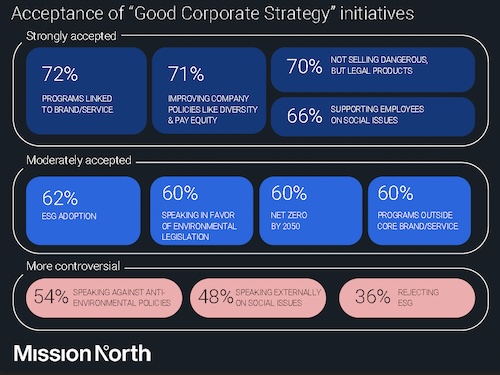 |
Consumers continue to place a premium on corporate responsibility, but they increasingly want to see that responsibility directed toward issues that affect the bottom line, according to a new study from Mission North.
The agency’s 2024 Brand Expectations Index, which asked 1,000 adults in the US to weigh in on what factors add to a brand’s value and which detract from it, found that when companies focus on issues that are tied to their core business, they are seen more positively by consumers.
The top thing that consumers expect from a brand: security. More than seven in 10 of those surveyed (71 percent) said they want brands to put an emphasis on customer security. Coming right behind was making customer privacy a priority (70 percent). Product innovation was also high on the list, at 66 percent.
When it comes to social responsibility, consumers expect brands to keep things close to home, with 61 percent saying they want companies to give back to their communities. Almost as many (59 percent) expect companies to improve their diversity and pay equity policies.
 |
Responsibility initiatives that look beyond the brand’s core business and its employees are not nearly so well regarded for the most part. Only 39 percent of respondents expect a company to take public stances on larger social issues, with slightly fewer (38 percent) thinking that taking bold actions on such issues is to be expected.
The one exception—six out of 10 respondents (60 percent) said they expect brands to “take strides to become more sustainable and environmentally friendly.”
Also, while respondents may not be gung-ho about a brand taking a stance on broader social issues, about two-thirds (66 percent) are in favor of supporting employees who do so.
The study also looks at what consumers expect from brands as regards the use of AI. Almost half (47 percent) think that AI will create “a more dangerous future,” with only 32 saying it will result in “a better future.” A considerable majority (62 percent) say companies should not “dramatically change their staffing levels” in response to AI, with only 22 percent agreeing that those who heavily invest in AI can stay relevant “even if that means a reduction in staff or layoffs at their company as a result.”
AI ranks rather low in the overall list of actions that made respondents say they would be more likely to trust a brand. Only 34 percent said that “companies that use AI to automate their internal process or operations” or “companies that use AI to improve how customers think about them” would seem more trustworthy.
That compares rather unfavorably with “companies that cut through corporate red tape” (48 percent), “companies that are future-focused” (67 percent) and “companies that own up to their mistakes. (74 percent).”


 Not all pressing issues require corporate voice! Brand stewards must must ask why and when their brands should engage, or if they need to engage on a particular issue at all.
Not all pressing issues require corporate voice! Brand stewards must must ask why and when their brands should engage, or if they need to engage on a particular issue at all. Dollar General investors voted in support of a shareholder resolution at its May 31 annual meeting for an independent third party audit of “worker safety and well-being.”
Dollar General investors voted in support of a shareholder resolution at its May 31 annual meeting for an independent third party audit of “worker safety and well-being.” Nonprofits and philanthropists have a unique opportunity to take ownership of conversations surrounding pressing social issues.
Nonprofits and philanthropists have a unique opportunity to take ownership of conversations surrounding pressing social issues. A renewed focus on “the business of the business” means CSR initiatives must be essential in building corporate brand equity—and the bottom line.
A renewed focus on “the business of the business” means CSR initiatives must be essential in building corporate brand equity—and the bottom line.


 Have a comment? Send it to
Have a comment? Send it to 
No comments have been submitted for this story yet.